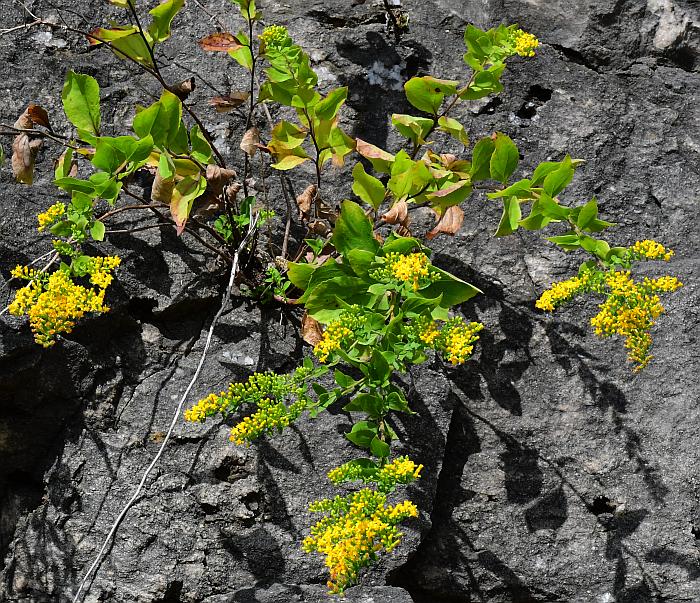Solidago drummondii Torr. & A. Gray
Ozark Goldenrod

Native
CC = 8
CW = 5
MOC = 38
© SRTurner
Solidago drummondii Torr. & A. GrayOzark Goldenrod | |
 |
Native CC = 8 CW = 5 MOC = 38 |
© SRTurner |
|
Family - Asteraceae/Astereae Habit - Perennial herb with short rootstock, sometimes producing rhizomes. Stems - Typically several from base, to 1 m, stiff, erect to sprawling (if perched on a rock face), densely pubescent with mostly spreading hairs.
Leaves - Basal leaves wilted at flowering. Stem leaves centrally disposed, with largest leaves 1/3 way up stem, to 8 cm long and 7 cm wide, mostly 1-2x as long as wide, broadly ovate or obovate, stiff, short-petiolate, the margins sharply toothed and hairy, the surfaces pubescent with spreading or curved hairs, the undersurface with 3 main veins but with secondary veinlets forming a conspicuous network.
Inflorescences - Open, pyramidal panicles, the branches usually arched or nodding, the heads oriented upward along the branches.
Heads - Involucre 3.0-4.5 mm long, the bracts in 3 or 4 unequal series. Involucral bracts rounded or blunt at the appressed-ascending tip (those of the outer series sometimes sharply pointed), the margins hairy (at least toward the tip), the outer surface glabrous. Receptacle naked.
Florets - Ray florets 3-7, the corollas 2-3 mm long, yellow. Disc florets 4-7, the corollas 3.0-3.5 mm long, the lobes 0.5-0.9 mm long, yellow. Pappus 2.0-2.5 mm bristles.
Fruits - Fruits 1.5-2.0 mm long, narrowly obovoid, finely hairy. Flowering - August - December. Habitat - Ledges of calcareous bluffs. Origin - Native to the U.S. Lookalikes - Other species of Solidago, e.g., S. ulmifolia and S. rugosa. Other info. - This species is very nearly a Missouri endemic, being restricted to mostly the eastern 2/3 of the state and a few counties in Arkansas, possibly with some occurrence in Illinois and Louisiana as well. It is found nearly exclusively on limestone or dolomite bluff ledges. Its habitat, along with the wide, toothed leaves on short petioles, make this plant easy to identify. Photographs taken at Salt Lick Point, near Valmeyer, Monroe County, IL, 10-3-2011 and 9-20-2021, and at Weldon Spring Conservation Area, St. Charles County, MO, 10-14-2011 (SRTurner). |